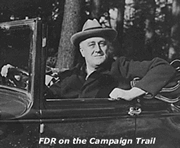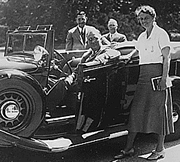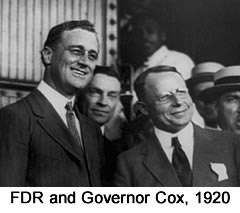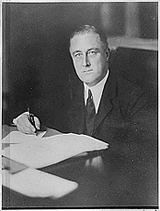Copyright © 2005-6, Henry J. Sage
Franklin Delano Roosevelt is generally regarded as the greatest president of the 20th century. Regardless of how one feels about his politics, his programs, or his political career and legacy, one must acknowledge the tremendous impact that he had on the office of the presidency and on the nation. He presided over two of  the most challenging periods in American history—the Great Depression and World War II. Although one might argue that Abraham Lincoln faced a greater challenge—a nation divided against itself—Franklin Roosevelt's contributions were nevertheless extraordinary
the most challenging periods in American history—the Great Depression and World War II. Although one might argue that Abraham Lincoln faced a greater challenge—a nation divided against itself—Franklin Roosevelt's contributions were nevertheless extraordinary
Franklin Roosevelt was an only child born into a wealthy family, a fifth cousin of Theodore Roosevelt. Along with Martin Van Buren, the two Roosevelt's are the American presidents numbered among the descendents of early Dutch settlers in New York. Franklin was an only child, the son of a prosperous father, James Roosevelt, and a very doting mother, Sara Delano Roosevelt. Young Franklin grew up in the Hudson Valley, was educated by private tutors and then attended the Groton School in Massachusetts, where he was taught Christian responsibility by Endicott Peabody. From from Groton he went on to Harvard, where he lived an active athletic and social life, though he never stood out as a scholar. Interested in politics from the beginning, he enthusiastically worked for his cousin Theodore's presidential campaign in 1904 as a Young Republican at Harvard.
While at Harvard, Franklin became attracted to his fifth cousin, Eleanor Roosevelt, Theodore's niece, and the two of them eventually married, over his mother's objections. (As a doting mother, she never believed that anyone could be good enough for her boy, and Eleanor was known as the ugly duckling of the family.) Franklin and Eleanor were attracted to each other more intellectually than physically, and despite later troubles in their marriage, they invariable saw eye to eye or many subjects. During their engagement Franklin entered Columbia Law School, and later dabbled in the profession, though his real interest was always politics. Franklin and Eleanor had five children and the marriage seemed stable, although Sara Roosevelt meddled incessantly in the lives of her son and daughter-in-law.
 Those close to Eleanor and Franklin Roosevelt felt they were attracted to each other more intellectually than physically; despite later troubles in their marriage, they invariably saw eye to eye on many subjects. The bride was given away by her uncle, President Theodore Roosevelt himself, with the result that Eleanor played second fiddle in terms of attention, even at her own wedding. Franklin was attending Columbia Law School at the time of their marriage, and his mother bought the young couple a spacious home in New York City. She then bought and moved into the home next door, where she could keep an eye on things. Franklin and Eleanor eventually had five children, and the marriage seemed stable, despite Sara Roosevelt’s incessant meddling in the lives of her son and daughter-in-law.
Those close to Eleanor and Franklin Roosevelt felt they were attracted to each other more intellectually than physically; despite later troubles in their marriage, they invariably saw eye to eye on many subjects. The bride was given away by her uncle, President Theodore Roosevelt himself, with the result that Eleanor played second fiddle in terms of attention, even at her own wedding. Franklin was attending Columbia Law School at the time of their marriage, and his mother bought the young couple a spacious home in New York City. She then bought and moved into the home next door, where she could keep an eye on things. Franklin and Eleanor eventually had five children, and the marriage seemed stable, despite Sara Roosevelt’s incessant meddling in the lives of her son and daughter-in-law.
Following graduation from Columbia, Franklin dabbled in the legal profession, but his real interest was always politics. In 1910 the young Roosevelt made his first foray into the political arena, as a Democrat, with cousin Theodore’s blessing. (Theodore Roosevelt was always able to work with members of the opposite party as long as he felt they were honorable men.) In a heavily Republican district, he was elected to the New York State Senate, which brought him to the attention of national Democratic leaders, including newly elected Governor Woodrow Wilson of New Jersey. When Wilson won the presidential election in 1912, he invited Franklin, who had pursued a progressive agenda in the New York legislature, to become assistant secretary the navy, a post that had been previously held by his cousin Theodore under President McKinley. Roosevelt accepted, and became an excellent assistant secretary, involving himself deeply in the affairs of the navy, in which he had great interest, and for which he had a great affection. He even vacationed on warships, often fishing off the stern of a destroyer or cruiser.
When the United States became involved in the First World War, Roosevelt was eager to serve, but Navy Secretary Josephus Daniels and President Wilson insisted that he remain in his post, where he would be far more valuable. As assistant secretary he traveled to Europe and visited the front lines, where he was appalled by what he saw of the horrific slaughter of the trench warfare. When he returned from the Europe, he was stricken with a serious case of flu, and while Eleanor was unpacking his bags, she discovered unmistakable evidence that Franklin had been having an affair with her personal secretary, Lucy Mercer. Eleanor offered to divorce Franklin, but as that would have ruined his political career, they stayed together, and although their marriage was never a romantic one thereafter, they eventually formed a unique and powerful political partnership.
 In 1920 Franklin was named vice presidential candidate for the Democratic Party, and ran alongside Governor Cox of Ohio. Warren Harding easily won the election, but Franklin used the opportunity to broaden his political horizons, meet new people, and build support for his promising political career. Then, in 1921, he was struck with poliomyelitis, commonly called infantile paralysis, and for a time it seemed as though his public life might be over. But in an extraordinary show of courage, he fought the disease, underwent the rigors of physical therapy, and although he was never again able to walk unaided, he grew strong enough that with the help of braces on his legs and someone to guide him, he could maneuver himself in an upright position. He was thus able to keep his political hopes alive. Although his infirmity was obviously known to many—he spent most of his time in a wheelchair—the public had no knowledge of the fact that he could not walk unaided. Despite his crippled legs, he projected a robust physical appearance and unmistakable vigor.
In 1920 Franklin was named vice presidential candidate for the Democratic Party, and ran alongside Governor Cox of Ohio. Warren Harding easily won the election, but Franklin used the opportunity to broaden his political horizons, meet new people, and build support for his promising political career. Then, in 1921, he was struck with poliomyelitis, commonly called infantile paralysis, and for a time it seemed as though his public life might be over. But in an extraordinary show of courage, he fought the disease, underwent the rigors of physical therapy, and although he was never again able to walk unaided, he grew strong enough that with the help of braces on his legs and someone to guide him, he could maneuver himself in an upright position. He was thus able to keep his political hopes alive. Although his infirmity was obviously known to many—he spent most of his time in a wheelchair—the public had no knowledge of the fact that he could not walk unaided. Despite his crippled legs, he projected a robust physical appearance and unmistakable vigor.
In 1928, after he had nominated New York Governor Al Smith at the Democratic National Convention as candidate for president, Smith persuaded him to run for governor of New York, hoping that it would help him with his electoral contest. Although Smith was defeated, Roosevelt won a resounding victory and became governor of the nation's most powerful state. During his first year in office, the stock market crash of 1929 occurred, and the nation was soon plunged into the worst depression in its history. The Depression provided Governor Roosevelt with an opportunity to address the needs of his state, and he soon began experimenting with various programs of the kind that would become part of his New Deal program. Reelected by a wide margin in 1930, Roosevelt attracted national attention and became a clear contender for the Democratic nomination for president in 1932.
As a progressive, FDR worked hard for reform legislation, and instituted programs designed to help those suffering under the economic cloud. He also sought the advice of experts in the fields of labor, economics, law and social reform. Those advisers, many of whom were professors and writers, were soon dubbed Roosevelt's “Brain Trust.” He also built an effective team of leaders at the state level, including Frances Perkins, Henry Morgenthau, and Harry Hopkins, who, along with the Brain trust, would continue to serve him in washington.
By 1932 it was clear that Herbert Hoover had not been able to rise to the challenge of addressing the issues of the Depression satisfactorily, and the Democrats, eager to break the Republican hold on the White House, nominated Franklin Roosevelt as their candidate. Defying precedent, Roosevelt flew from New York to the Democratic convention in Chicago to personally accept the nomination. A powerful, vigorous speaker, Roosevelt set off on a campaign that swept him into the White House by a huge margin. The era of Franklin Roosevelt had begun.
Into that troubled world of the Great Depression came Franklin Delano Roosevelt. To this day he is one of the most controversial presidents in our history, yet by almost any definition, one of our greatest. Like his progressive predecessors in the White House—his cousin Theodore and Woodrow Wilson, whom he served as assistant secretary of the Navy for eight years—FDR saw government as an instrument for helping people. He presided over two of the most challenging periods in American history—the Great Depression and World War II. Although one might argue that Abraham Lincoln faced a greater challenge—a nation divided against itself—Franklin Roosevelt’s contributions were nevertheless extraordinary. His unprecedented use of the power of government to attempt to aid the economy was meant to counter the economic decline, and while many Americans were no doubt aided by his New Deal programs, the precedents he set have come in for considerable criticism.
As a progressive, FDR worked hard for reform legislation, and instituted programs designed to help those suffering under the economic cloud. He also sought the advice of experts in the fields of labor, economics, law, and social reform. Those advisers, many of whom were professors and writers, were soon dubbed Roosevelt’s “Brain Trust.” He also built an effective team of leaders at the state level, including Frances Perkins, Henry Morgenthau, and Harry Hopkins, who, along with other members of FDR’s “brain trust,” would continue to serve him in Washington.
Perhaps the most interesting speech of Roosevelt's career was his Commonwealth Club Address, which he made during the 1932 campaign. It reveals his political ideals quite clearly.
Franklin was charming, handsome, intelligent, athletic, and likable, but not all who met him were impressed with his depth. One of the most famous quotations about his character came from Supreme Court Justice Oliver Wendell Holmes Jr.: “A second-class intellect, but a first class temperament.” By 1932 it was clear that Herbert Hoover had not been successful in addressing the issues of the Depression. The Democrats, eager to break the Republican hold on the White House, nominated New York Governor Franklin Roosevelt as their candidate. Defying precedent, Roosevelt flew from New York to the Democratic convention in Chicago to personally accept the nomination, the first time a nominee had so addressed a party convention. A powerful, vigorous speaker despite his infirmity, FDR told the assembled delegates:
This is no time for fear, for reaction or for timidity. . . . What do the people of America want more than anything else? To my mind, they want two things: work, with all the moral and spiritual values that go with it; and with work, a reasonable measure of security—security for themselves and for their wives and children. Work and security . . . the true goal toward which our efforts of reconstruction should lead. These are the values that this program is intended to gain; these are the values we have failed to achieve by the leadership we now have. . . .
. . . I pledge you, I pledge myself, to a new deal for the American people. Let us all here assembled constitute ourselves prophets of a new order of competence and of courage. This is more than a political campaign; it is a call to arms. Give me your help, not to win votes alone, but to win in this crusade to restore America to its own people.
With those words Roosevelt set off on a campaign that swept him into the White House by a huge margin.
 The campaign of 1932 was a single-issue campaign: what to do about the Great Depression. President Hoover had struggled sincerely but ineffectively to set the wheels of industry in motion again. Roosevelt, calling on his progressive roots, claimed that the Depression was rooted in underlying flaws in the American economy. He argued that Republican policies of the 1920s had aggravated the situation. In his Commonwealth Club address of September 1932 he argued that “the function of government must be to favor no small group at the expense of its duty to protect the rights of personal freedom and of private property of all its citizens.” Observing that the country was “steering a steady course toward economic oligarchy,” he proposed that “the task of government in its relation to business is to assist the development of an economic declaration of rights, an economic constitutional order. … It is the minimum requirement of a more permanently safe order of things.”
The campaign of 1932 was a single-issue campaign: what to do about the Great Depression. President Hoover had struggled sincerely but ineffectively to set the wheels of industry in motion again. Roosevelt, calling on his progressive roots, claimed that the Depression was rooted in underlying flaws in the American economy. He argued that Republican policies of the 1920s had aggravated the situation. In his Commonwealth Club address of September 1932 he argued that “the function of government must be to favor no small group at the expense of its duty to protect the rights of personal freedom and of private property of all its citizens.” Observing that the country was “steering a steady course toward economic oligarchy,” he proposed that “the task of government in its relation to business is to assist the development of an economic declaration of rights, an economic constitutional order. … It is the minimum requirement of a more permanently safe order of things.”
The result of the election was a foregone conclusion: Roosevelt reversed the Republican landslide of 1928 and won 22.8 million votes to Hoover’s 15.7 million. Roosevelt garnered 472 electoral votes to 59 for President Hoover. The United States was about to enter the “New Deal” era, the era of Franklin D. Roosevelt.
Franklin Roosevelt was not capable of ending the Depression by himself, but he was willing to try almost anything, and try he did. He brought a sense of hope to Washington and conveyed it to the American people. At the same time, FDR was by no means without his critics. Those on the left accused him of being a closet capitalist, and those on the right accused him of betraying his patrician class with socialist ideas. Roosevelt took it all in stride, commenting that because he was being attacked from both sides of the political spectrum, then he must at least be doing something right. FDR’s New Deal did not end the Depression, but it changed the relationship between the government and the American people forever, and its legacy is still with us. Memories of the Great Depression have all but disappeared except among the very old, but the effects of the Depression have never completely gone away.
| Depression New Deal Home | First New Deal | Updated November 2, 2021 |